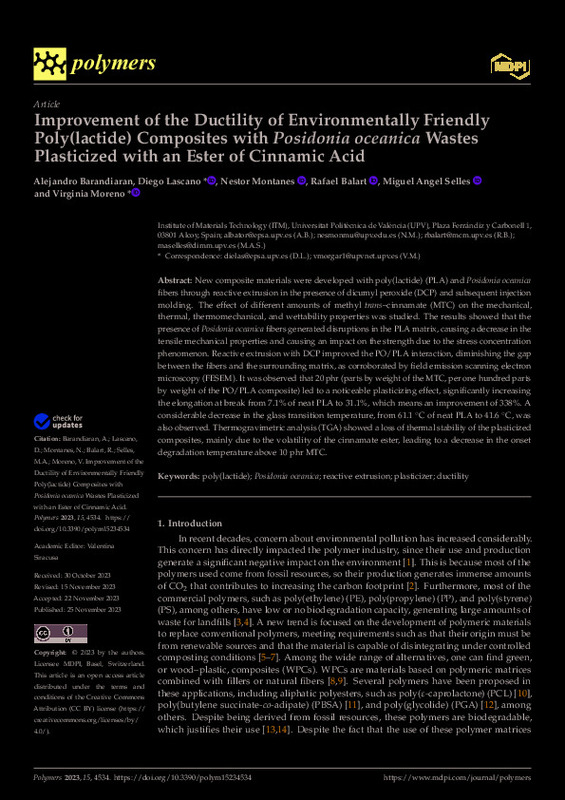JavaScript is disabled for your browser. Some features of this site may not work without it.
Buscar en RiuNet
Listar
Mi cuenta
Estadísticas
Ayuda RiuNet
Admin. UPV
Improvement of the Ductility of Environmentally Friendly Poly(lactide) Composites with Posidonia oceanica Wastes Plasticized with an Ester of Cinnamic Acid
Mostrar el registro sencillo del ítem
Ficheros en el ítem
| dc.contributor.author | Barandiaran, Alejandro
|
es_ES |
| dc.contributor.author | Lascano-Aimacaña, Diego Sebastián
|
es_ES |
| dc.contributor.author | Montanes, Nestor
|
es_ES |
| dc.contributor.author | Balart, Rafael
|
es_ES |
| dc.contributor.author | Sellés, M.A.
|
es_ES |
| dc.contributor.author | Moreno-García, Virginia
|
es_ES |
| dc.date.accessioned | 2024-02-26T19:02:25Z | |
| dc.date.available | 2024-02-26T19:02:25Z | |
| dc.date.issued | 2023-12 | es_ES |
| dc.identifier.uri | http://hdl.handle.net/10251/202772 | |
| dc.description.abstract | [EN] New composite materials were developed with poly(lactide) (PLA) and Posidonia oceanica fibers through reactive extrusion in the presence of dicumyl peroxide (DCP) and subsequent injection molding. The effect of different amounts of methyl trans¿cinnamate (MTC) on the mechanical, thermal, thermomechanical, and wettability properties was studied. The results showed that the presence of Posidonia oceanica fibers generated disruptions in the PLA matrix, causing a decrease in the tensile mechanical properties and causing an impact on the strength due to the stress concentration phenomenon. Reactive extrusion with DCP improved the PO/PLA interaction, diminishing the gap between the fibers and the surrounding matrix, as corroborated by field emission scanning electron microscopy (FESEM). It was observed that 20 phr (parts by weight of the MTC, per one hundred parts by weight of the PO/PLA composite) led to a noticeable plasticizing effect, significantly increasing the elongation at break from 7.1% of neat PLA to 31.1%, which means an improvement of 338%. A considerable decrease in the glass transition temperature, from 61.1 °C of neat PLA to 41.6 °C, was also observed. Thermogravimetric analysis (TGA) showed a loss of thermal stability of the plasticized composites, mainly due to the volatility of the cinnamate ester, leading to a decrease in the onset degradation temperature above 10 phr MTC. | es_ES |
| dc.description.sponsorship | This research is a part of the grant PID2020-116496RB-C22 and TED2021-131762A-I00 funded by MCIN/AEI/10.13039/501100011033 and the European Union ¿NextGenerationEU¿/PRTR¿. The authors also thank Generalitat Valenciana-GVA, grant number AICO/2021/025 and CIGE/2021/094, for supporting this work. | es_ES |
| dc.language | Inglés | es_ES |
| dc.publisher | MDPI AG | es_ES |
| dc.relation.ispartof | Polymers | es_ES |
| dc.rights | Reconocimiento (by) | es_ES |
| dc.subject | Poly(lactide) | es_ES |
| dc.subject | Posidonia oceanica | es_ES |
| dc.subject | Reactive extrusion | es_ES |
| dc.subject | Plasticizer | es_ES |
| dc.subject | Ductility | es_ES |
| dc.subject.classification | CIENCIA DE LOS MATERIALES E INGENIERIA METALURGICA | es_ES |
| dc.subject.classification | INGENIERIA DE LOS PROCESOS DE FABRICACION | es_ES |
| dc.title | Improvement of the Ductility of Environmentally Friendly Poly(lactide) Composites with Posidonia oceanica Wastes Plasticized with an Ester of Cinnamic Acid | es_ES |
| dc.type | Artículo | es_ES |
| dc.identifier.doi | 10.3390/polym15234534 | es_ES |
| dc.relation.projectID | info:eu-repo/grantAgreement/AEI/Plan Estatal de Investigación Científica y Técnica y de Innovación 2017-2020/PID2020-116496RB-C22/ES/OBTENCION DE NANOCOMPOSITES DE ORIGEN BIO A PARTIR DE RESIDUOS LIGNOCELULOSICOS PARA SU USO EN FILMS MULTICAPA/ | es_ES |
| dc.relation.projectID | info:eu-repo/grantAgreement/GENERALITAT VALENCIANA//CIGE%2F2021%2F094//Desarrollo de materiales técnicos compuestos sostenibles de alto rendimiento medioambiental a partir de la revalorización de residuos de algas/ | es_ES |
| dc.relation.projectID | info:eu-repo/grantAgreement/GENERALITAT VALENCIANA//AICO%2F2021%2F025//NUEVOS MATERIALES SOSTENIBLES DERIVADOS DE LA REVALORIZACIÓN DE RESIDUOS DE LA INDUSTRIA DE CÍTRICOS ¿ CitricNewLife/ | es_ES |
| dc.relation.projectID | info:eu-repo/grantAgreement/AEI//TED2021-131762A-I00//DESARROLLO Y OPTIMIZACION DE NUEVOS MATERIALES COMPUESTOS DE ALTO RENDIMIENTO MEDIOAMBIENTAL A PARTIR DE LA REVALORIZACION DE RESIDUOS DE POSIDONIA OCEANICA/ | es_ES |
| dc.rights.accessRights | Abierto | es_ES |
| dc.contributor.affiliation | Universitat Politècnica de València. Escuela Politécnica Superior de Alcoy - Escola Politècnica Superior d'Alcoi | es_ES |
| dc.description.bibliographicCitation | Barandiaran, A.; Lascano-Aimacaña, DS.; Montanes, N.; Balart, R.; Sellés, M.; Moreno-García, V. (2023). Improvement of the Ductility of Environmentally Friendly Poly(lactide) Composites with Posidonia oceanica Wastes Plasticized with an Ester of Cinnamic Acid. Polymers. 15(23). https://doi.org/10.3390/polym15234534 | es_ES |
| dc.description.accrualMethod | S | es_ES |
| dc.relation.publisherversion | https://doi.org/10.3390/polym15234534 | es_ES |
| dc.type.version | info:eu-repo/semantics/publishedVersion | es_ES |
| dc.description.volume | 15 | es_ES |
| dc.description.issue | 23 | es_ES |
| dc.identifier.eissn | 2073-4360 | es_ES |
| dc.identifier.pmid | 38231960 | es_ES |
| dc.identifier.pmcid | PMC10708467 | es_ES |
| dc.relation.pasarela | S\504364 | es_ES |
| dc.contributor.funder | GENERALITAT VALENCIANA | es_ES |
| dc.contributor.funder | AGENCIA ESTATAL DE INVESTIGACION | es_ES |
| dc.subject.ods | 08.- Fomentar el crecimiento económico sostenido, inclusivo y sostenible, el empleo pleno y productivo, y el trabajo decente para todos | es_ES |
| dc.subject.ods | 09.- Desarrollar infraestructuras resilientes, promover la industrialización inclusiva y sostenible, y fomentar la innovación | es_ES |
| dc.subject.ods | 12.- Garantizar las pautas de consumo y de producción sostenibles | es_ES |








